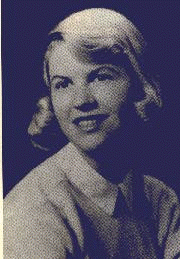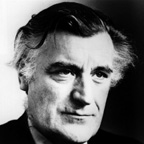|

Sylvia Plath |

Ted Hughes |
Cinderella
The prince leans to the girl in scarlet heels,
Her green eyes slant, hair flaring in a fan
Of silver as the rondo slows; now reels
Begin on tilted violins to span
The whole revolving tall glass palace hall
Where guests slide gliding into light like wine;
Rose candles flicker on the lilac wall
Reflecting in a million flagons' shine,
And glided couples all in whirling trance
Follow holiday revel begun long since,
Until near twelve the strange girl all at once
Guilt-stricken halts, pales, clings to the prince
As amid the hectic music and cocktail talk
She hears the caustic ticking of the clock.
http://www.angelfire.com/tn/plath/cin.html
|
Lovesong
He loved her and she loved him.
His kisses sucked out her whole past and future or tried to
He had no other appetite
She bit him she gnawed him she sucked
She wanted him complete inside her
Safe and sure forever and ever
Their little cries fluttered into the curtains
Her eyes wanted nothing to get away
Her looks nailed down his hands his wrists his elbows
He gripped her hard so that life
Should not drag her from that moment
He wanted all future to cease
He wanted to topple with his arms round her
Off that moment's brink and into nothing
Or everlasting or whatever there was
Her embrace was an immense press
To print him into her bones
His smiles were the garrets of a fairy palace
Where the real world would never come
Her smiles were spider bites
So he would lie still till she felt hungry
His words were occupying armies
Her laughs were an assassin's attempts
His looks were bullets daggers of revenge
His glances were ghosts in the corner with horrible secrets
His whispers were whips and jackboots
Her kisses were lawyers steadily writing
His caresses were the last hooks of a castaway
Her love-tricks were the grinding of locks
And their deep cries crawled over the floors
Like an animal dragging a great trap
His promises were the surgeon's gag
Her promises took the top off his skull
She would get a brooch made of it
His vows pulled out all her sinews
He showed her how to make a love-knot
Her vows put his eyes in formalin
At the back of her secret drawer
Their screams stuck in the wall
Their heads fell apart into sleep like the two halves
Of a lopped melon, but love is hard to stop
In their entwined sleep they exchanged arms and legs
In their dreams their brains took each other hostage
In the morning they wore each other's face
http://www.poemhunter.com/p/m/poem.asp?poet=6616&poem=30213
|
In this essay, I have compared the poems
“Cinderella” of Sylvia Plath and Ted Hughes´ poem “Lovesong”.
The poem of Sylvia Plath “Cinderella” is
a sonnet. It is divided in three quatrains and a
couplet; the rhyme scheme is: abab cdcd efef gg.
As the title says, the poem is about the
famous fairy-tale “Cinderella”. The poem is situated on the scene, when
Cinderella and the prince are at the ball. But suddenly, she becomes
pale, it is almost 12 o´clock and she has to go.
The poem can clearly be divided in two
parts:
-
1st, the two quatrains at the
beginning: when they are at the ball, in the palace.
-
2nd, the third quatrain and the couplet: the girl becomes
aware of the time, and that she has to go.
So, this poem narrates a part of a
famous tale that everyone is supposed to know. We know all that has happened
before, and also the reasons why she has to go. Cinderella is like living a
dream, but it is going to finish soon. The poem centres on the feeling of having
to go, the proximity of the ending of a dream.
It is not presented as a happy passage,
also they are in a ball. The melancholy of the poem is quite present. Also the
couple are together in a happy situation, they are not enjoying that moment.
Because she has in mind the fact of the time.
She knows she is living a dream that is
going to end very soon. This can be a thought present in the mind of the poem,
she feels like Cinderella. Maybe Plath is also afraid of
the ending of this dream and she is not able to enjoy it.
The clock is a clear symbol of time.
Time goes by and with time all good things end. Also dreams go by and reality
comes back.
The isolation of the girl is also seen
in the poem. She is with her love in a love plenty of people. But she does not
seem to share with them the moment. She also is described
as a strange girl, there is certain mystery around her. For the prince she is
also a strange girl, that he does not really know.
This isolation between one and the other
is also seen in the way they are presented. There is a social difference between
them. He is a prince, and she is only a girl, her name only appears in the
title. She has no name in the poem.
Taking into account that she is a woman who
writes the poem, we can guess how she feels through the poem. Sylvia Plath
identifies herself with Cinderella, she loves a man that she considers more powerful
than her. She considers herself as an anonymous person compared with Hughes. So,
in this poem both lovers are not at the same level.
Ted Hughes´poem “Lovesong” is divided in
six stanzas.
In the first one, the love situation is
presented. He loves her, and she loves him. Their love is corresponded.
In the second stanza: they are enjoying
that moment together.
In the third stanza: there is an
enumeration of the physical situation, also the kisses, caresses they give each
other.
In the fourth stanza, that is a couplet:
after the physical encounter, they sleep.
In the fifth stanza: while they are
sleeping they are together.
The final verse, as a conclusion, says
that when they get up in the morning, one had become the other.
As the title says, this poem is about
love. It is the story of the love of a couple. The first thing the poem says is
that they love each other. So their love is corresponded, and it is the
important thing.
Then, everything is
described is an explicit physical encounter between these lovers. First, the
feelings are presented; then the physical action. But all these action is full
of love feelings. The physical encounter is a consequence of their love. They
express all the love they feel through kisses, caresses…
The poem is full of enumerations (Her
laughs, his looks, his caresses…). It is like trying to express with words his
feelings, the poet starts expressing all and cannot stop.
Also in the poem there is parallelism in
the words. Such parallelism is represented by the lovers, they love each other
in the same degree.
These two poems have in common the love
theme. But the poets express it in a different way.
The tone of the poems is quite
different. In “Cinderella” there is a certain sadness, also the lovers are
together. Whereas in “Lovesong” they love each other and see how they enjoy
the moment being together.
“Cinderella” ends in a kind of suspense.
But it is supposed that the reader knows the tale. Here, there is a separation
of the lovers. In “Lovesong”, at the end, the couple is so united that one
becomes the other.
In Hughes´ poem, the characters have no
name, they are he and she. They could be any couple of lovers. But they are at
the same level.
In Plath´s poem, in the couple only
the prince has
a name. She is referred to as the girl. She only has
a name in the title.
This shows that they are not at the same social level.
In one poem and in the other, time is
given different importance. In “Cinderella” she knows time goes by, but she does
nothing to enjoy the time she has. In “Lovesong” time is not important; what
is important is the present moment, future or past does not matter. We do not
know how much time they have to be together, but they enjoy the moment in which
they are.
After analysing these poems and taking
into account who writes the poem; we can see the differences in how they express
themselves in a poem.
Sylvia Plath uses the device of a
fairy-tale to express how she feels. Whereas, Hughes describes a love scene
where the protagonist is the physical encounter.
So, the woman can not limit to describe
the love scene. She can not take into account only love; there are other
external features that influence her perceptions. Her personal situation
influences the poem very much.
For Hughes, there is only important the
present moment. Time does not exist or anything more.
When we reed Hughes poem we see
described what he wants to tell; but when we read Plath´s poem we notice that
there is something more behind what she says.

